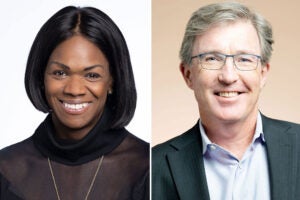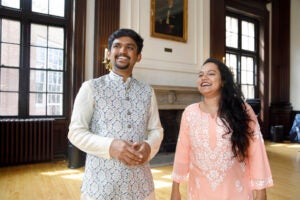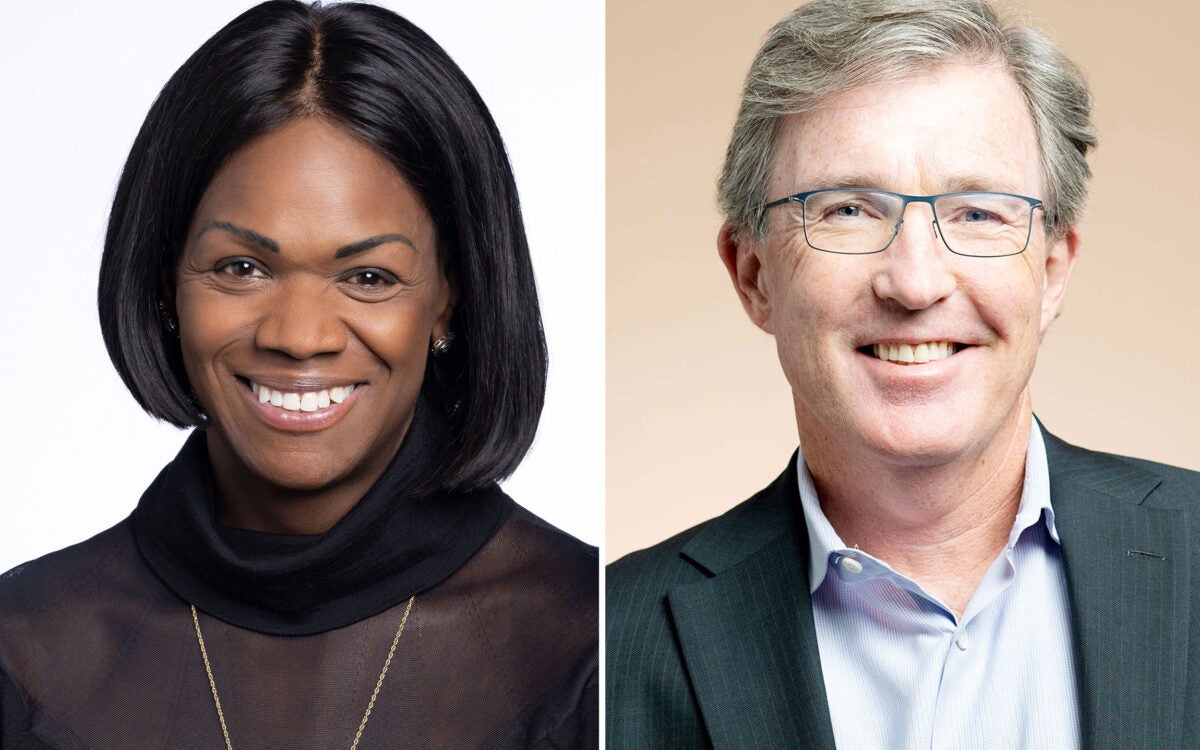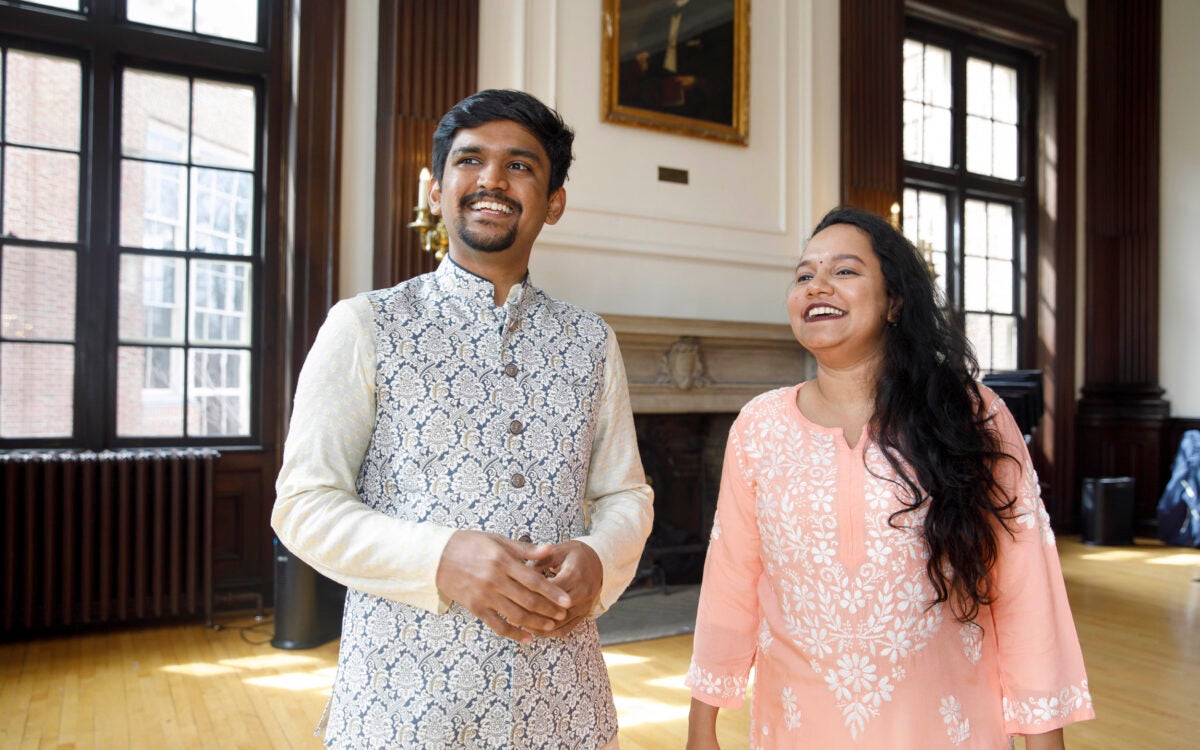Humanists, scientists, artists among new fellows at Radcliffe
The Radcliffe Institute for Advanced Study at Harvard University has announced the names of 32 women and 19 men selected to be 2007–08 Radcliffe Fellows. The fellows — among them 18 humanists, 13 scientists, 12 creative artists, and eight social scientists — will work individually and across disciplines on projects chosen for both quality and long-term impact. Their projects range from the production of a film and photographic series on 21st century American workers to research into deriving heart cells from stem cells to improve cardiovascular development.
“We are delighted to welcome these distinguished scholars, scientists, and artists to Radcliffe. We look forward to seeing new friendships and collaborations form and to witnessing the ways the fellows’ interactions and the freedom provided by the fellowship year influence their work,” said Barbara J. Grosz, interim dean (effective July 1) and dean of science at the Radcliffe Institute and Higgins Professor of Natural Sciences in Harvard’s School of Engineering and Applied Sciences.
“In my years as dean, I have been privileged to watch the fellows interact with one another and with faculty members in various departments across Harvard. From the vantage point of the Harvard presidency, I will continue to watch and admire their path-breaking work and interdisciplinary approaches,” said Drew G. Faust, dean of the Radcliffe Institute and president-elect of Harvard.
Unique among the nation’s centers for advanced studies, the Radcliffe Institute hosts artists, musicians, and fiction writers, as well as academic researchers and professionals. Selected from a pool of more than 775 applicants, the 2007–08 fellows are a diverse group of distinguished and emerging scholars and artists from the United States and other countries. Mahzarin Banaji, the Carol K. Pforzheimer Professor at the Radcliffe Institute and the Richard Clarke Cabot Professor of Social Ethics at Harvard, will work among the fellows and continue her research on the developmental and evolutionary origins of social cognition.
Now in its seventh year, the Radcliffe Institute Fellowship Program is a highly competitive program that has provided yearlong residencies to more than 350 award-winning writers, artists, scientists, and other scholars. Examples of past fellows are acclaimed installation artist Shimon Attie, Pulitzer Prize–winning author Geraldine Brooks, and anthropologist Nancy Scheper-Hughes, a leading commentator on the global traffic in human organs.
Radcliffe Institute Fellows and their projects
Elizabeth Alexander, Mildred Londa Weisman Fellow, Yale University, African American Studies: “A New Genealogy of African American Experimental Poetry.”
Elizabeth Armstrong, Suzanne Young Murray Fellow, Indiana University, sociology: “College Culture and Social Inequality.”
Mulatu Astatke, independent composer, music composition: “Ethiopian Christian Creativity in Transnational Perspective.”
Mahzarin Banaji, Carol K. Pforzheimer Professor at the Radcliffe Institute, Harvard University, psychology: “Brains, Babies, and Baboons: Understanding the Developmental and Evolutionary Origins of Social Cognition.”
Rebecca Baron, David and Roberta Logie Fellow and Radcliffe-Harvard Film Study Center Fellow, Massachusetts College of Art, film/video making: “What Nature Tells Us.”
Giorgio Bertellini, Sargent-Faull Fellow, University of Michigan, film studies: “Divo/Duce: Italian Masculinity Crossing Over to 1920s America.”
Lisa Bielawa, Mary I. Bunting Institute Fellow, Boston Modern Orchestra Project, music composition: “Double Violin Concerto and Smaller Works.”
Jin-Yi Cai, Augustus Anson Whitney Scholar, University of Wisconsin, Madison, computer science: “The Theory of Holographic Algorithms.”
Tianxi Cai, Joy Foundation Fellow, Harvard School of Public Health, statistics and biostatistics: “Development and Evaluation of Diagnostic and Prognostic Rules with Biological and Genomic Markers.”
Daniel Carpenter, Harvard University, political science: “The Anti-Slavery Petition in Political and Organizational Context.”
Kathleen Cash, Hrdy Fellow, independent scholar, education: “Telling Them Their Own Stories: Integrating Ethnographic Research and Pedagogy in a Model of HIV/AIDS Prevention for Vulnerable Women in Thailand, Bangladesh, Uganda, Haiti, and Los Angeles.”
Elaine Chew, Edward, Frances, and Shirley B. Daniels Fellow, University of Southern California, mathematics, computation, and music: “Analytical Listening Through Interactive Visualization.”
Michael Crescimanno, Benjamin White Whitney Scholar, Youngstown State University, physics: “Multiphoton Quantum Optics of Dilute Alkali Vapors.”
Christopher Csikszentmihalyi, David and Roberta Logie Fellow, MIT, new media: “Familiars.”
Christine Dakin, Evelyn Green Davis Fellow, independent artist, dance performance: “The Body Speaks — Capturing Martha Graham’s Dance Art.”
Beshara Doumani, Rita E. Hauser Fellow, University of California, Berkeley, history: “Adjudicating Family: Gender, Property, and the Praxis of Islamic Law.”
Alexandre Francois, University of Southern California, computer science: “Analytical Listening Through Interactive Visualization.”
David Frankfurter, Lillian Gollay Knafel Fellow, University of New Hampshire, history of religion: “Worlds of Christianization in Late Antique Egypt.”
Kate Gilhuly, Bunting Fellow, Wellesley College, classical studies: “Landscapes of Desire in Classical Athenian Literature.”
Andrew Gordon, Elizabeth S. and Richard M. Cashin Fellow, Harvard University, history: “Stitching in Modern Times.”
Vivian Gornick, Vera M. Schuyler Institute Fellow, independent writer, nonfiction: “Emma Goldman.”
Hildegarde Heynen, Constance E. Smith Fellow, Katholieke Universiteit Leuven, architectural history: “Sibyl Moholy-Nagy and the Vicissitudes of Modern Architecture.”
Liisa Holm, William and Flora Hewlett Foundation Fellow, University of Helsinki, molecular and cellular biology: “Functional Hierarchy and Function Determining Residues of Protein Families.”
Anette (Peko) Hosoi,* American Fellow, MIT: “Bioengineering Swimming, Crawling, and Burrowing: Optimization of Low Re Locomotion.”
Steven Kaplan, Hebrew University, religion: “Ethiopian Christian Creativity in Transnational Perspective.”
Frances Kissling, Catholics for a Free Choice, nonfiction: “How to Think about Abortion: Pro-choice Reflections on Rights and Responsibility.”
Jané Kondev, Grass Fellow, Brandeis University, physics: “Physical Biology of the Cell.”
Susan Lindquist, Suzanne Young Murray Fellow, Whitehead Institute for Biomedical Research, molecular and cellular biology: “Shaping the Relationship Between Genotype and Phenotype.”
Sharon Lockhart, “Radcliffe-Harvard Film Study Center Fellow, University of Southern California, Los Angeles, film/video making: “Lunchbreak.”
Catherine Lutz, Matina S. Horner Distinguished Visiting Professor, Brown University, social/cultural anthropology: “Full Metal Jacket: The Car, U.S. Cultures, and Their Contradictions.”
Jacqueline Malone, Queens College, City University of New York, nonfiction: “Jazz Music in Motion: African American Chorus Line Dancers in Harlem, 1925–1955.”
Cathie Martin, Katherine Hampson Bessell Fellow, Boston University, political science: “In Search of Self: The Organization of Business Interests for Collective Social Policies.”
Carla Mazzio, University of Chicago, literature: “Calculating Minds: Literature and Mathematics in the Renaissance.”
Mitchell Merback, DePauw University, art history: “The Radical German Renaissance: Art, Dissent, and Religious Regime in the Era of Reform, 1490–1555.”
Ryan Minor, State University of New York, Stony Brook, musicology: “Choral Fantasies: Festivity, Nationhood, and the Chorus in 19th Century Germany.”
Christine Mummery,* Harvard Stem Cell Institute Radcliffe Fellow, Hubrecht Laboratory, molecular and cellular biology: “Engineering the Right Scaffold: How Matrix Flexibility May Determine Cardiac Cell Fate.”
Craig Murphy, Wellesley College, international relations: “Setting the World’s Standards.”
Maria Orive, The Carl and Lily Pforzheimer Foundation Fellow, University of Kansas, evolutionary and organismic biology: “Together and Apart: Theoretical Models of Host-Symbiont Genome Evolution.”
Timothy Rood, St Hugh’s College, University of Oxford, classical studies: “Anabasis: Xenophon and the March of the Ten Thousand.”
Daniel Rothman, Jeanne Rosselet Fellow, MIT, Earth and planetary sciences: “Physics of Earth’s Carbon Cycle.”
Elena Ruehr, Walter Jackson Bate Fellow, MIT, music composition: “Cantata Averno.”
Robert Self, Burkhardt Fellow, Brown University, history: “The Politics of Gender and Sexuality in the U.S. from Watts to Reagan.”
Qin Shao, College of New Jersey, history: “Demolition: Housing Reform and Conflict in Urban China, 1980–2005.”
Kay Shelemay, Harvard, musicology: “Ethiopian Christian Creativity in Transnational Perspective.”
Martin Summers, Burkhardt Fellow, University of Oregon, history: “Race, Madness, and the State: A History of African American Patients at St. Elizabeth’s Hospital, 1855–1970.”
Megan Sweeney, Bunting Fellow, University of Michigan, cultural studies: “Reckonings: Cultures of Reading in Women’s Prisons.”
Emma Teng, Burkhardt Fellow, MIT, Chinese studies: “The Chinese Eurasian: East-West Interracialism at the Turn of the 20th Century.”
Magdalena Teter, Emeline Bigelow Conland Fellow, Wesleyan University, history: “An Anatomy of Religious Violence: Jews and Christians in Premodern Poland.”
Jane Wang, Cornell University, biophysics: “Evolution of Efficient Locomotion in Fluids: Paper Falling, Insect and Bird Flight, and Fish Swimming.”
Kate (Katherine) Wheeler, Frieda L. Miller Fellowship, Tufts University, fiction: “The Guru’s Wife.”
Wendy Wood, Helen Putnam Fellow, Duke University, psychology: “Psychology of Gender: Evolutionary and Social Structural Influences on Mate Preferences.”
*fall only
The 2008–09 fellowship applications for creative artists, humanists, and social scientists are due Oct. 1, 2007; applications for natural scientists and mathematicians are due Dec. 3, 2007 (postmarked for materials sent by mail). For more information about the fellowship program, call (617) 495-8212 or visithttp://www.radcliffe.edu/fellowships.




